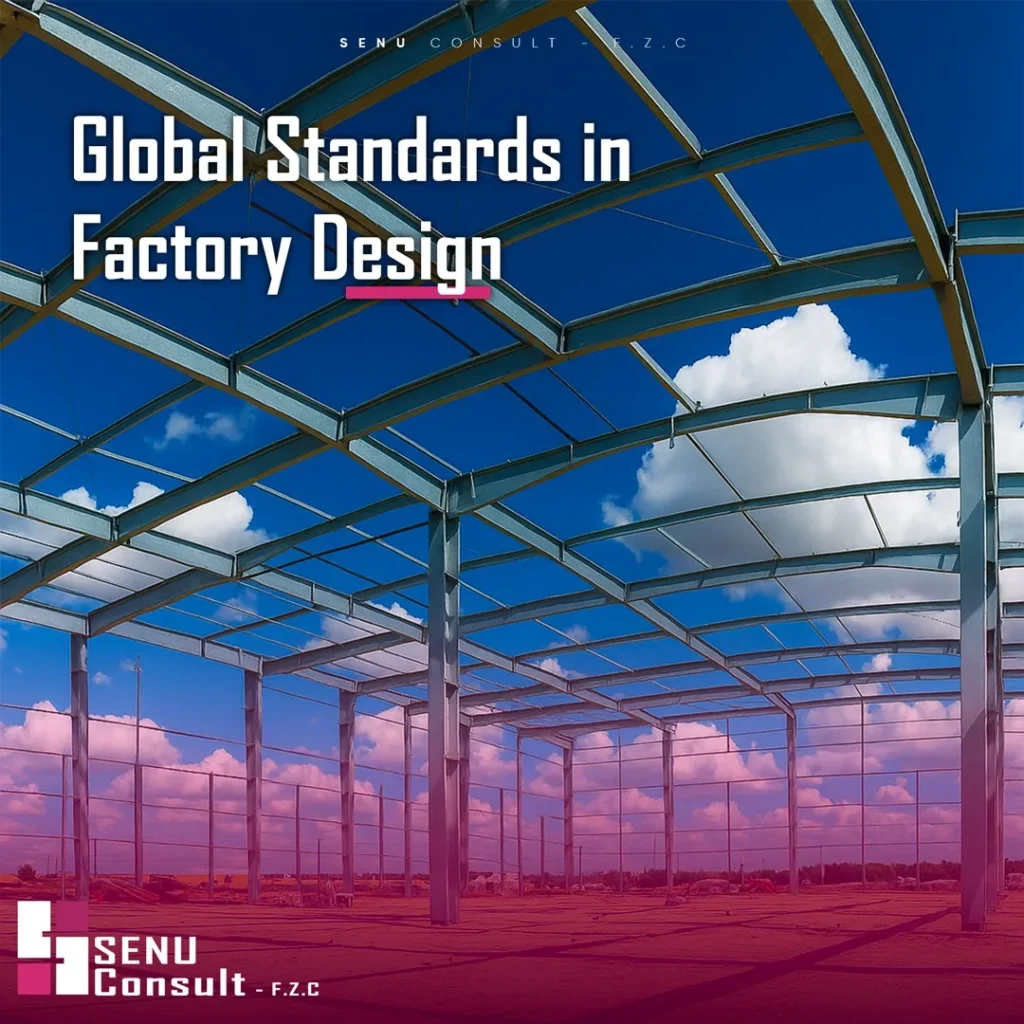Global Standards in Factory Design
Introduction: Why Compliance in Design is the Cornerstone of Success in Pharmaceutical Projects?
In today’s pharmaceutical industry. factory design is no longer just an engineering or architectural step aimed at providing solid buildings and advanced equipment. It has become a fundamental pillar for the overall success of the project.
Pharmaceutical facilities are subject to strict requirements and standards set by global and local regulatory bodies such as the U.S. Food and Drug Administration (FDA) . the European Medicines Agency (EMA) . and the Saudi Food and Drug Authority (SFDA).
Compliance with these standards from the very beginning is not optional . it is the only path to accelerate factory approval. ensure regulatory adherence. and secure long-term operational success.
Global Standards in Factory Design: FDA, EMA, SFDA as a Reference for Your Project’s Success
Many pharmaceutical projects have stumbled and faced years of delays. not due to lack of funding or weak operational capabilities. but because regulatory requirements were overlooked during the early design stages.
These mistakes. although seemingly small at first. evolve into major obstacles during inspections and audits. costing companies millions in redesign and corrective measures.
This is where Senu Consult brings unmatched value. With over 50 years of combined expertise in pharmaceutical engineering and facility design. the firm ensures that all regulatory requirements are integrated from day one. Through the “Born Operational” philosophy. facilities are designed to be compliant and ready for operation without the need for extensive modifications later.
The Importance of Compliance in Design: More than a Regulatory Obligation.
Compliance as a Shortcut to Operational Readiness
When designing a new pharmaceutical plant. compliance with FDA, EMA. or SFDA requirements significantly accelerates operational approval. Without it, projects may face years of delays for redesigns. and in some cases. outright rejection if inspections reveal fundamental non-compliance.
Cost Savings and Avoiding Expensive Redesigns
Any design flaw that requires correction after construction multiplies costs dramatically. For instance, redesigning HVAC airflow or creating new containment zones post-construction can cost millions. Investing in compliance-focused design from the beginning is the most cost-effective solution.
Protecting Corporate Reputation in Global Markets
Failure to pass FDA or EMA inspections doesn’t only affect local approval; it can also jeopardize international export opportunities. Companies that prioritize compliance at the design stage secure their competitiveness in a sector governed by trust and transparency.
Key Regulatory Requirements: FDA, EMA, SFDA .
1. FDA – Stringent U.S. Manufacturing Standards
- The FDA mandates compliance with current Good Manufacturing Practices (cGMP) . which require:
- Logical flow of materials and products to avoid cross-contamination.
- Precisely engineered HVAC systems to control particulates and contaminants.
- Sterile areas with positive air pressure.
- Separate routes for personnel and raw materials to minimize contamination risks.
- Strict documentation and control systems ensuring full traceability of production processes.
2. EMA – European Quality Standards
The European Medicines Agency emphasizes:
- Validation of all processes and equipment.
- Risk management embedded in engineering design.
- Infrastructure flexibility to accommodate future expansions.
- Adherence to rigorous European environmental and health standards.
3. SFDA – Saudi Standards Integrated with Global Requirements
The Saudi Food and Drug Authority (SFDA) combines global GMP requirements with local considerations. It requires:
- Compliance with standards comparable to FDA and EMA.
- Facility design tailored to Saudi operational environments (climate, energy, supply chains).
- Alignment with Saudi Vision 2030 goals promoting local pharmaceutical manufacturing.
How Senu Consult Ensures Compliance Integration into Design?

The “Born Operational” Concept
Senu Consult applies the Born Operational philosophy. meaning facilities are designed from day one to be compliant and ready for operation. This includes:
- Considering operational workflows before drawing walls.
- Designing material and personnel flowcharts early in the process.
- Ensuring every engineering detail supports regulatory compliance.
Practical Applications of the Approach
- Material flow design: separating raw materials from finished products.
- Air handling systems: HVAC ensuring correct pressure differentials between clean areas.
- Isolation zones: establishing sterile areas for handling highly sensitive products.
- Digital monitoring: integrating SCADA and BMS systems for real-time operational oversight.
Common Mistakes in Pharmaceutical Facility Design.
– Poor space planning leading to cross-contamination risks.
– Ignoring air isolation requirements resulting in immediate rejection during inspections.
– Lack of planning for future expansions rendering facilities outdated quickly.
– Skipping design reviews, which exposes design flaws too late.
Such errors are widespread in underprepared projects and are the leading cause of delays. sometimes extending project timelines by up to 70%.
Founders’ Expertise: An Invaluable Asset.
Senu Consult’s leadership. represented by Eng. Ihab and Dr. Bahaa, brings decades of direct experience in major pharmaceutical projects worldwide. Their expertise is not theoretical . it comes from leading and designing facilities that successfully passed the toughest international audits.
– Their experience ensures avoidance of common pitfalls in compliance.
– They provide practical, tailored solutions to complex regulatory challenges.
– Their focus on engineering precision. (as highlighted in Eng. Ihab’s LinkedIn video) transforms design into a roadmap for compliance and operational success.
Conclusion: Success Starts with the Right Design.
Designing a pharmaceutical facility aligned with FDA, EMA, and SFDA standards is not just a technical step . it is a strategic investment ensuring the project’s success and longevity. Implementing the Born Operational concept through Senu Consult sets your project on the right path from day one: reducing costs, accelerating readiness. and guaranteeing sustainable compliance.
Start your project with confidence—success begins with design.
For expert consultation. visit: https://senuconsult.com/
Follow more of our services here
Explore Services
+971 56 636 0153
info@senuconsult.com
Have Any Questions? Contact us here
+971566360153 or
info@senuconsult.com


